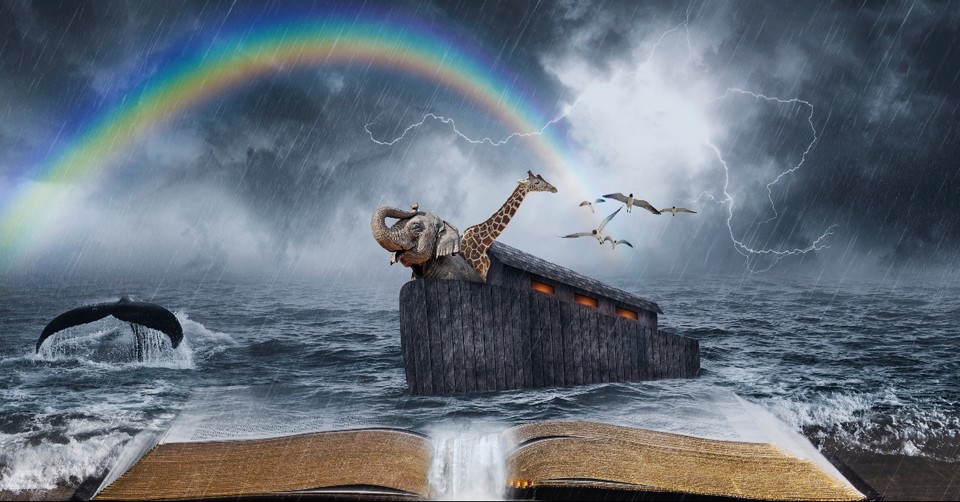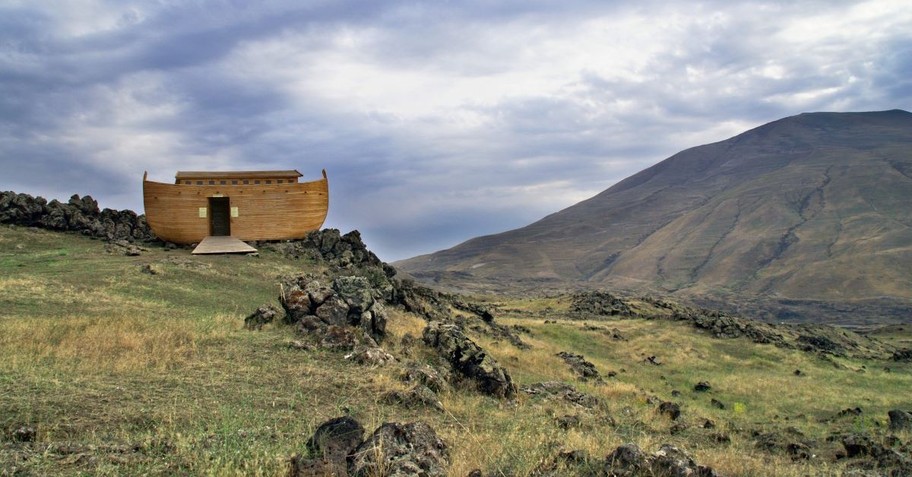5 Things to Know about Noah in the Bible

“Noah did everything just as God commanded him.” Genesis 6:22 NLT
Who Is Noah in the Bible?
Noah’s great faith in the Lord is one of the most recognizable stories in the Scripture. The story is recorded in the first book of the Bible, in Genesis. The Lord saw how corrupt the earth had become, and vowed to destroy it, in order to start afresh. He instructed Noah to build an ark in preparation, and load his family and two of every creature on the earth into the boat to preserve life on earth.
Regarding 'faith,' Carrie Lowrance for Crosswalk.com states, "The Hebrew word for faith is Emunah which means “support.” This is perfect because faith is like “the Lord’s support” to us because he is working in every situation for his glory. Regardless of what we think, He always knows best, and there are many times we have to see by faith and not our own eyes." Many of us would question God’s detailed plan to build an ark. Movies have been made to depict what the scene might have looked like, but Noah chose obedience to God over all else.
Photo credit: iStock/Getty Images Plus/Javier_Art_Photography
Here Are 5 Things to Know about Noah in the Bible:
1. Noah Means “Rest” in Hebrew
“Noah did everything just as God commanded him.” Genesis 6:27 NLT
Noah’s name is the Hebrew word for rest or calm. Calm means to be without rough motion; still or nearly still. Rest is defined as refreshing quiet; ease; support. Yet, in the verse above, we learn Noah was anything but motionless or still- he was not quiet, or at ease. He went to work obediently, in everything God had commanded him. After the storm raged in the ark and drowned the earth and everything in it, the ark floated peacefully as the waters resided.
Eventually, Noah and his family stepped foot on the dry ground of earth once more, on the refreshed ground of the earth made new. To rest in the Lord, we learn from Noah, doesn’t always assume idleness, stillness, or lack of activity, but a calm, confident, and unwavering trust, faithfulness, and obedience to the Lord. In our modern moments, we have the peace of Christ, which surpasses all understanding, to guard our hearts in tribulation and trying moments of obedience in our walk through this life on earth.
2. Noah’s Father Predicted the Flood
“He named him Noah and said, ‘He will comfort us in the labor and painful toil of our hands caused by the ground the LORD has cursed.’” Genesis 5:29 NLT
Noah’s father is mentioned in Genesis and is recorded as being 182 years old when he had a son named Noah. His father Lamech lived for 777 years, and his grandfather, Methuselah, lived for 969 years …the oldest age recorded in the Bible! “Noah is first mentioned in the Bible when his father Lamech predicted the upcoming destruction of the earth and Noah’s role in restoring mankind,” Madeline Kalu explains. His father foretells the turmoil of the earth and Noah’s role as “comfort in the labor and painful toil…” Comfort is akin to the words rest and calm, which define Noah’s name … and the Lord’s purpose for his life.

3. God Gave Noah Favor
“Noah was a righteous man, blameless among the people of his time, and he walked faithfully with God.” Genesis 6:9 NLT
Even amidst a world running rampant in rebellion and corruption, God found favor on Noah for his righteousness. “Finding favor means gaining approval, acceptance, or special benefits or blessings,” Baker’s Evangelical Dictionary of Biblical Theology explains, “The favor that human beings receive from God depends on his good pleasure and is often extended in response to prayer or righteous living.”
God is merciful, compassionate, forgiving, and just. He is the very root of love. The joy we have in Christ is the favor of the Lord! We are favored, chosen, and loved. Genesis 8:1 says, “But God remembered Noah and all the wild animals and the livestock that were with him in the ark, and he sent a wind over the earth, and the waters receded.” (Genesis 8:1 NLT) God remembered Noah, and He remembers us.
4. Noah Was 600 Years Old at the Time of the Flood
“Noah was six hundred years old when the floodwaters came on the earth.” Genesis 7:6 NLT
Noah was 500 years old when he became a father, and 600 years old when the flood wiped out the earth. “In the six hundredth year of Noah’s life, on the seventeenth day of the second month- on that day all the springs of the great deep burst forth, and the floodgates of the heavens were opened. And the rain fell on the earth forty days and forty nights.” Genesis 7:11-12 NLT After the flood, Noah lived another 350 years! He died when He was 950 years old. Centuries of life lived on earth, yet one year was of particular importance. One year, out of 950, remains Biblical legend, God’s covenant promise marked in the sky by rainbows from then until now.
“By the first day of the first month of Noah’s six hundred and first year, the water had dried up from the earth. Noah then removed the covering from the ark and saw that the surface of the ground was dry.” Genesis 8:13 NLT
Life is short, no matter how long we live on this earth. Time is fleeting, and the days of our lives are numbered and known by the Lord, alone. His purposes are good, and in a fraction of the entirety of our lives on this earth, He can move through us with the power of a flood.
Photo credit: ©Getty Images/Julia_Sudnitskaya

5. Noah and Those on the Ark Were the Only Survivors of the Flood
“Every living thing on the face of the earth was wiped out; people and animals and the creatures that move along the ground and the birds were wiped from the earth. Only Noah was left, and those with him in the ark. The waters flooded the earth for a hundred and fifty days.” Genesis 7:23-24 NLT
The people of the earth, to this day, are flawed and cursed with by our sinful nature. It’s not the way we were designed, but nevertheless, we are held hostage by its curse until Jesus returns to bring us home to heaven for eternity. In the meantime, people come and go from this earth. Often, those of us left behind wonder, why did I survive? I wonder if Noah and his family ever had thoughts that wandered to wonder why they survived the flood. Scripture says the Lord recognized Noah’s righteous life, but I wonder if he mourned for all those who were lost in the flood.
From the only survivors, the Lord repopulated the earth. His ways are not only good, they are miraculous. What God can do with one righteous life is beyond the capacity we have to understand. The tracks of our obedience trace the globe in ways we cannot imagine. No life is wasted.
“This is the sign of the covenant I am making between me and you and every living creature with you, a covenant for all generations to come: I have set my rainbow in the clouds, and it will be the sign of the covenant between me and earth. Whenever I bring clouds over the earth and the rainbow appears in the clouds, I will remember my covenant between me and you and all living creatures of every kind.” Genesis 9:12-15 NLT
Rainbows. Some are so massive they disappear back into the clouds before we can trace where one end begins and the other ends. Sometimes, there are double rainbows! Often, the calm after a storm includes a rainbow. A sign of hope and a symbol of covenant. No rainbow is ever an accident. To witness one is to experience the God of Hope reaching out directly in comfort, faithfulness, encouragement, purpose, and love. Noah’s life hold’s many lessons and reminders we can apply relevantly today. Our lives, too, are built with a purpose that will outlast our time on this earth. Look up to the skies, for this is where our Hope comes from.
Photo credit: ©GettyImages/photostockam
Originally published February 24, 2022.






